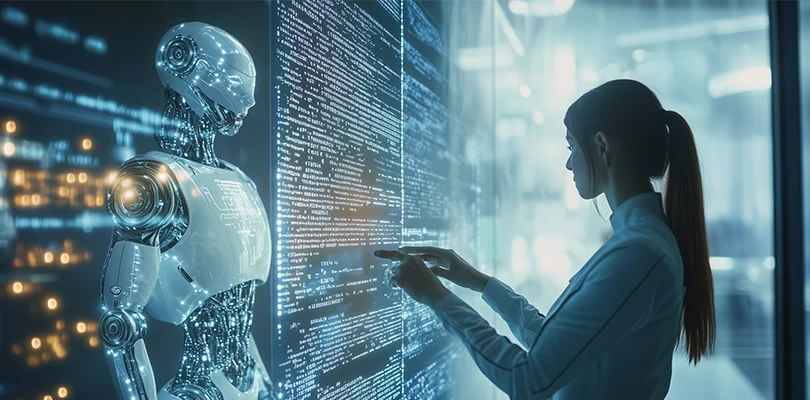AI in Coding: Revolutionizing Development and Innovation

Artificial intelligence (AI) is not just a buzzword in the tech industry; it represents a paradigm shift in how software is developed. As we advance into a new era, AI's impact on coding is profound, influencing every aspect from the initial coding phase to deployment and beyond. This article examines the multifaceted role of AI in coding, exploring how these technologies are not only streamlining processes but also empowering developers to push the boundaries of what's possible. We'll delve into practical applications, educational impacts, and the latest innovations that are shaping the future of programming.
AI-Powered Coding Assistants: Enhancing Productivity and Precision
The introduction of AI into the development environment has led to the creation of sophisticated coding assistants that revolutionize how code is written:
GitHub Copilot: Utilizing the power of the OpenAI's Codex model, GitHub Copilot doesn't just suggest the next line of code; it can generate entire functions or even modules based on natural language comments or existing code. For example, if a developer comments, "Sort this list of numbers," Copilot can write out the sorting algorithm. Its integration with popular IDEs now includes features like multi-line suggestions, which can predict and complete more complex coding sequences, thus significantly reducing the cognitive load on developers.
Tabnine: Known for its machine learning capabilities, Tabnine offers more than just code completion. It learns from your code base and provides suggestions that adhere to your project's style guide. This tool can be particularly useful in large teams where maintaining coding standards is crucial. Tabnine also supports a wide array of programming languages, from Python to Go, making it versatile across different tech stacks.
Automated Code Reviews and Quality Enhancement
AI has transformed the tedious process of code review:
DeepCode: This tool goes beyond static analysis by using AI to understand the intent behind the code. It compares your code against millions of open-source projects to find and suggest fixes for potential bugs, security vulnerabilities, or performance issues that might not be caught by traditional methods.
Amazon CodeGuru: Specifically designed for AWS developers, CodeGuru uses machine learning to provide recommendations on improving application performance, reliability, and security. For instance, it can detect resource leaks or suggest refactoring for better performance. By integrating with CI/CD pipelines, CodeGuru ensures that code quality checks are part of the development lifecycle, not an afterthought.
AI in Debugging and Error Detection
Debugging, often a developer's nightmare, is being simplified:
Snyk: Focused on security, Snyk scans for vulnerabilities in your dependencies. When it finds a potential issue, it doesn't just alert you; it also suggests updates or alternative packages that are safer. This proactive approach significantly reduces the time developers spend on fixing security flaws post-deployment.
Microsoft IntelliCode: This tool learns from code repositories to provide context-aware suggestions. It can predict likely bugs based on coding patterns and even suggest tests that you might not have thought to write, thereby enhancing the robustness of your application from the start.
Education and Skill Development Through AI
AI's role in education is transformative:
CodeSignal: This platform uses AI to assess coding skills in a way that simulates real-world coding environments, providing a more accurate reflection of a developer's capabilities than traditional tests. It adjusts the difficulty of challenges based on performance, ensuring that learners are always pushed but not overwhelmed.
LeetCode: While well-known, its integration of AI helps in customizing problem sets for users, aiming to address their specific weaknesses. LeetCode also offers solutions with explanations, which are generated or improved by AI, helping users understand different approaches to solving problems.
Recent Innovations and Future Trends
Explainable AI: This area is crucial for AI's acceptance in critical systems. In coding, explainable AI means tools that can not only suggest changes but explain why they are necessary, which is invaluable for learning and trust-building.
Natural Language Processing (NLP) Advancements: Imagine telling your coding tool, "I need a function that filters out all even numbers from this list," and it writes that function for you. This isn't a distant future; tools are already in development that translate natural language into code, making programming accessible to those who might not write code themselves but can describe what they want.
AI-Driven Documentation: Tools like CodeDocs are automating the documentation process, ensuring that as code changes, documentation evolves in real-time. This not only saves time but ensures documentation is accurate and consistent, which is vital for team collaboration and maintenance.
Conclusion
AI's integration into software development is not just evolutionary; it's revolutionary. By automating mundane tasks, improving code quality, and making coding more intuitive, AI is not only enhancing productivity but also fostering an environment where innovation thrives. As AI tools become more sophisticated, they promise to democratize coding, allowing more people to participate in software creation, from seasoned developers to beginners. The future of coding with AI looks bright, with each advancement bringing us closer to a world where the focus shifts from writing code to designing solutions. As we continue to explore and integrate these technologies, the potential for what we can achieve with software is boundless.
Notification!




